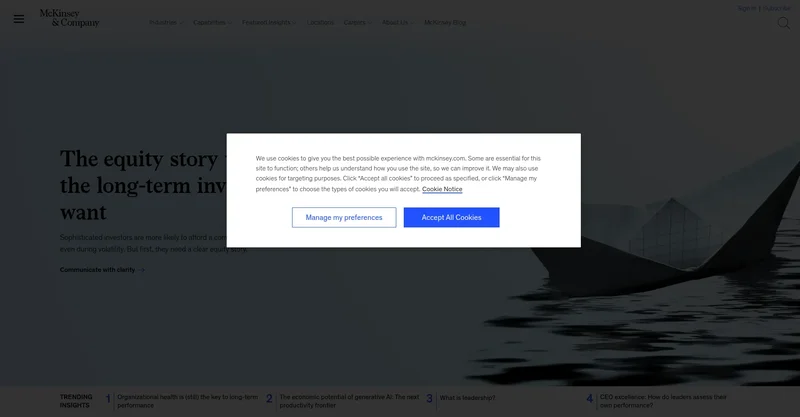McKinsey's AI Gamble: Are We Witnessing the Dawn of Outcome-Based Consulting?
Okay, folks, buckle up, because something HUGE is happening in the world of consulting, and it's all thanks to the rise of AI. McKinsey & Company, you know, the McKinsey & Company, is fundamentally changing how they make money. Forget the old model of billing by the hour; they're increasingly betting on outcomes. And honestly, when I first read about this, I just had to sit back and process the sheer scale of the shift. It's not just about tweaking a business model; it’s about aligning incentives in a way that could revolutionize the entire industry.
It used to be simple: a client would come to McKinsey with a problem, McKinsey would assess the scope, and then slap a fee on it based on the time and manpower required. But now, clients are walking in and saying, "Here's the result we want. What will it take, and how much skin do you have in the game?" McKinsey, in turn, is increasingly tying its fees to the actual performance they deliver. Think of it like this: instead of paying a painter by the hour, you're paying them based on how amazing the finished portrait looks. It's a complete game changer!
The AI-Driven Transformation
This shift isn't just some random business decision; it's deeply intertwined with the AI revolution. Kate Smaje, global leader of tech and AI at McKinsey, nailed it when she said that the type of work AI transformation demands suits outcomes-based pricing. And she is right. We're talking about multi-year, multidisciplinary projects that require deep implementation expertise. People may still think of consultants as delivering straight strategy advice, but that now makes up less than 20% of the company's work. Instead, clients are turning to them for "deep implementation expertise" and multi-year transformation projects that require support across the business from data to workforce policies. AI is reshaping how McKinsey makes money
What this means, in essence, is that McKinsey is becoming more of a partner than a vendor. They're sharing the risk, and more importantly, sharing the reward. About a quarter of McKinsey's global fees already come from this pricing model, and they expect it to increase. Imagine the implications! Suddenly, consultants are incentivized to deliver real, measurable results, not just churn out reports.

This is where the "Big Idea" hits. It’s about a total realignment of incentives. It's about consultants having real skin in the game. It’s about a world where expertise is valued based on tangible results, not just billable hours.
This echoes the sentiment of Raj Sharma, EY's global managing partner for growth and innovation, who sees AI agents potentially ushering in a "service-as-a-software" approach where clients pay based on outcome. This uses AI agents—in simpler terms, software programs that can automate complex tasks—to achieve specific results. The speed of this is just staggering—it means the gap between today and tomorrow is closing faster than we can even comprehend.
Now, let's pause for a moment. This isn't all sunshine and rainbows. As with any major shift, there are ethical considerations. We need to ensure that this outcome-based model doesn't incentivize consultants to cut corners or prioritize short-term gains over long-term sustainability. It's a responsibility we all share—consultants, clients, and observers alike—to ensure that this new paradigm is used for good.
But, honestly, the potential here is just too exciting to ignore. Imagine a world where every industry is driven by this level of accountability and shared success. That's the kind of future I want to be a part of.
A New Era of Accountability Dawns
So, what's the real story? It's a revolution in consulting driven by AI, where expertise is valued based on tangible results, creating a future of shared success and accountability. This is the kind of breakthrough that reminds me why I got into this field in the first place.









